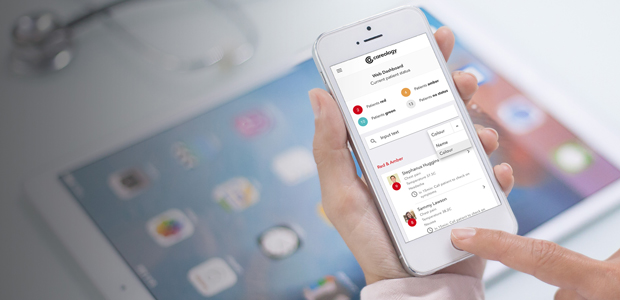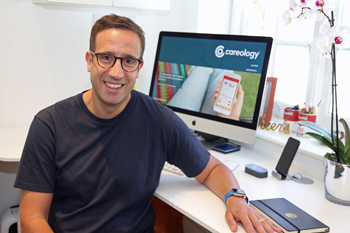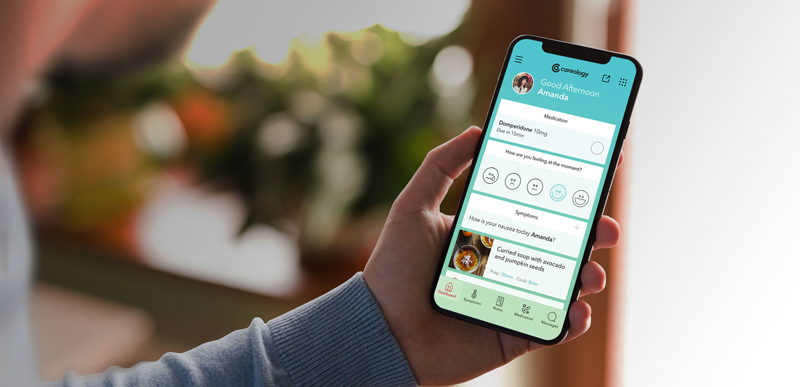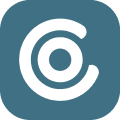
How technology is improving cancer patient experiences
Paul Landau, Founder and CEO of Careology, started his entrepreneurial journey back in 2005. Before tracking steps was cool and when wearable technology was just beginning to emerge, he created a healthtech company which tracked its users’ fitness levels, sleep, aerobic steps and calories burned.
At the end of 2015, Landau decided to take a step back from the business, at around the same time that his wife was diagnosed with cancer. While she was undergoing treatment, Landau noticed how consumer technology could have been far better used to support someone going through a very daunting journey.
“Fifteen years of consumer healthtech experience meant I couldn’t help but spot the clear opportunity to support people going through treatment by creating great software and wearable tech - providing greater control and useful tools to help deal with the raft of things that need managing.
“I wanted to connect people with a cancer diagnosis to their family and friends, and to their clinicians, to give peace of mind that if something needs attention, the people that matter know about it quickly and can act quickly, before things become more severe,” explained Landau.
When talking to Landau about everything Careology, something in particular really stood out to me. It was the way this healthtech founder has designed the platform to not only cater to the needs of the patient, but to everyone involved.
The patients
Careology uses thoughtful technology to make things less complicated and help patients deal with their circumstances more easily. The aim is for users to feel confident and cared for, and most importantly, to still feel like themselves. Careology is focused on putting patients back in control and helping those closest to them to support them in ways they need it most.
Step one is monitoring. The platform allows patients to record their symptoms and side effects to easily keep track of how they’re feeling and see when to contact their care team. Careology integrates with a range of health-tracking devices that track temperature, heart rate, blood pressure, weight, and activity levels.
Careology recognise that journaling is another important part of the journey, so they’ve created an area within the app, where patients can save the things that need remembering so that they’re easy to recall and share. Users can jot down questions, organise their thoughts and keep track of how they’re feeling each day.
Different drugs and doses on different days can be hard to remember, but when you are undergoing treatment this task is made even harder. Therefore, the platform helps users keep on track with their medication, ensuring its always taken on time by scheduling reminders. Patients also have a calendar function so they can access a complete record of symptoms, side effects, medications, notes and appointments - all in one place.
Whenever a patient is concerned, the Careology platform enables them to share their status with their care provider so they can check things over, removing the guesswork to make sure they don’t feel like a nuisance. Careology wants its users to let friends and family see how they are doing, so that they can support you wherever they are based.
Careology always provides relevant content personalised to you, from tips on dealing with treatment, recipes crafted by expert dieticians and useful articles, to product suggestions based on patients preferences and needs.

The friends and family
As someone who has witnessed first-hand the difficulties of caring for someone with a serious disease, Landau saw the importance of providing support and keeping friends and family connected with their loved ones.
It’s clear to see that Landau designed the platform with everyone’s needs in mind. When talking about Careology, he stressed the importance of friends and family being able to check in on their loved one’s symptoms and side effects to see how they’re doing, wherever they are. But without always needing to ask. He said: “One of the key learnings I took from my wife, was that cancer is still such a stigmatised disease. You get so sick of being sick. And you just want to be treated like the same person you were before your diagnosis, because you are the same person, you just happen to have been diagnosed with something you wish you hadn’t. And it struck me that despite being so unwell, she didn’t want to be a nuisance. We would often debate whether she really had to let her nurses know about the side effects she was suffering. She would always want to avoid going back to hospital for more prodding.
“Sometimes people can underestimate the responsibility that is also on friends and family who are obviously worried sick. It can be a real struggle to find the balance of being there for your family member, but at the same time not driving them crazy with constant questions about their treatment.
“We created this function to give family and friends the reassurance they need, and I think it helps them to find the right balance. For example, say you have got a parent who you don’t live with anymore that’s currently undergoing treatment. You want to be able to check they’ve taken their meds and aren’t sitting at home suffering with a fever. Through the app, you can check in with how they’re feeling, without having to be constantly nagging them.”
Careology aims to be an ongoing link for patients and patient’s loved ones which can also be shared with their loved one’s healthcare team. If something looks wrong, they can be alerted straight away, and given access to the information they need.
The clinicians
Standard cancer care greatly relies on the patients at home recognising and raising concerns about their own symptoms, side effects and overall wellbeing.
Careology Professional monitors a range of data about a patient’s overall status, to reduce the onus on them and instead flags potential issues automatically in real-time. This gives healthcare teams the chance to intervene early, transforming the efficiency and delivery of care.
The platform delivers real-time monitoring of a range of key metrics - from vital signs and wellbeing measures, to SACT toxicities and medication adherence. Timely, accurate data, presented through the clinician dashboard, allows healthcare teams to assess patient status, see how well they are tolerating treatment and make interventions early if needed.
Landau recognised the importance of reducing complications. He explained: “We know that time can be of the essence and having sight of possible complications early can make a world of difference as to how issues can be resolved. Careology Professional makes it possible to have real-time visibility of your entire population and be alerted to any potential issues that may arise, meaning earlier interventions are possible.”
It’s normal for patients to feel lots of different emotions when they finish cancer treatment. Some people often feel most vulnerable and isolated when treatment has actually finished. Careology is there to help patients for the long term and provide as much support as they can.
Let’s talk about the other C word…
Coronavirus. A word that has become a part of our daily vocabulary. Yes, I know we are all sick of talking about it now, but I couldn’t not bring this up… especially as Careology are doing some amazing work around it.
Of course, the coronavirus has affected every single industry, in more ways than one, and it’s been an extremely stressful time for all businesses, no matter how big or small. But looking on the bright side, it has been incredible to see the adoption of new technologies in the healthcare system over the past few months.
“Video consultations and remote care has rapidly become very prevalent. If you need to talk to your GP, you’re much more likely to get a video consultation today than a face-to-face consultation, which has never been the way before. And now we are introducing video consultation into our platform.
“For example, a clinician that needs to see how one of their patients is doing, can now have that consultation over video. This is so important because it means they can see into the whites of their patients’ eyes and visibly see how they are. However, from our perspective, it’s also really important that those video consultations are also backed up by data and what that video consultation doesn’t tell the clinician, is how the patient has been over the past week or two. Has there been a build-up in symptoms? Is there a build up in signs that could lead to a complexity?
“In many ways the coronavirus has forced healthcare providers, that can sometimes be fairly conservative and slow to adopt innovative new technologies, to suddenly start embracing technology (like Careology for example), that can help them with remote tools to manage their patients, without having to bring them into a high risk environment. As a clinician looking after vulnerable groups, you don't want to be getting put at risk either. So, the more you can do to keep patients safely in their own homes, protecting them from picking something up, but also protecting yourselves, the better,” explained Landau.
Over the past ten weeks, Careology has been working behind the scenes to create Corona Connect (launching very soon). As coronavirus began to spread, it struck the team at Careology, that they could adapt the technology they’ve already created for cancer patients, to be used for coronavirus patients.
“We knew that there would be many people across the country that would be self-isolating and wouldn’t be able to see loved ones, and this meant that in the same way patients can track their cancer-related symptoms, they could also track their coronavirus symptoms, so their family can keep an eye on them. But also, we knew that this data would be very useful for the scientists and clinicians as they are trying to learn as much as they can about this still very new, unknown virus. It has been great to see how versatile our platform really is,” explained Landau.
The business side of things
Careology has a B2B and a B2C channel. The company’s main route to market is selling or licensing the platform to healthcare providers and healthcare insurance companies, whether it be through the NHS or the private sector.
Through the B2C offering, users can download the app for free for iOS on the Apple App Store and there is plans to expand the app for Android users. The company also intends to introduce a premium offering with additional services, on a subscription basis.
There’s pretty much an app for everything nowadays. However, Careology have found that there aren’t a huge number of players in their market. Landau said: “There isn’t anybody else who provides an end-to-end solution like we do. But there’s a few things that I believe make us stand out.
“Firstly, our consumerised approach is extremely important to us, from the very beginning I knew that we didn’t want to treat patients like patients. From a user interface and user experience perspective, we’ve designed something that treats patients like people. Secondly, there is our end-to-end proposition that accommodates both patients, caregivers and clinicians which is unique in the market.”
To date Careology has been angel funded. When talking to many startups, one of the biggest challenges they have to overcome is funding. I asked Landau about his experience: “It’s definitely not easy. That first major round, when you’re pre-revenue, is always going to be the hardest, but I’ve been fortunate - with my background I’ve built up a good network that has helped open many doors. Many of our investors have had a personal experience of cancer themselves or with a loved one and when people have been in that position, they absolutely get what Careology is about and the huge potential that it could have globally.
“My advice to other startups looking to raise funds would be to really connect with your personal story because once you’ve established that then investors can understand the role that your technology can play and the benefits it will bring to the marketplace. The key thing to remember is perseverance!”
The next step
Careology could be considered to be in the best sector currently, as it’s the one that’s constantly moving - even more so in the current climate. However, it’s still a worrying time for all. Landau explained that the company has been very careful with managing cash and reallocating spend in two key areas of the business. He said: “It’s not necessarily about cutting back as hard as you can. But more about making sure you’re budgeting wisely, and reallocating spend that’s going to make the most difference as we start to come out of this period.
“We are now starting to think about our next round of funding to ensure that we can actually put our foot on the gas as we come through this period, rather than cutting back so far that it would take time to accelerate again.”
A sad statistic from the NHS, is that one-in-two people will develop some sort of cancer during their lifetime. My own family has been affected by cancer and while I briefly touched upon it earlier, and even though many of us have now had some sort of encounter with the disease, it can still be so stigmatised. As soon as we hear the word ‘cancer’ we want to run, we want to hide, and we don’t want to talk about it. But we should because cancer is a very real thing.
As happy as I am to say that my mum is now in remission and doing well, I wish I had known about Careology at the time because it’s clear to see that the company is transforming how people with a cancer diagnosis (and their family and friends) are supported, as well as how their healthcare team interacts with them.


